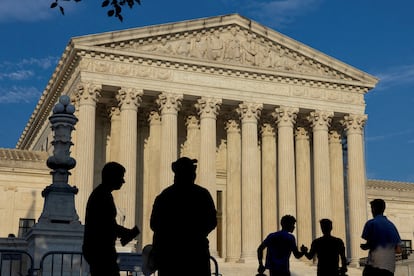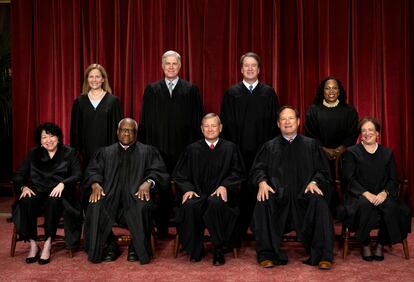US Supreme Court enters fourth year of conservative revolution with possible Trump cases on horizon
The death penalty, firearms, pornography, nuclear waste and trans rights are some of the issues to be addressed by the justices, who could decide on the former president’s convictions and legal challenges to the election results


Richard Glossip has faced execution eight times, and on three occasions, he underwent the ritual of a last meal on death row. This week, he has a new opportunity to save his life, as his case will be among the first considered by the U.S. Supreme Court in its new judicial year, which begins on Monday with two lawsuits focusing on technical and procedural issues. In the coming months, the justices — who have been advancing a conservative agenda for the past three years — will deliberate on cases related to firearms, access to pornography, environmental issues, trans rights, and one case that underscores the Court’s current orientation: discrimination against heterosexuals.
New dishes will be added to the menu, some of which are quite juicy. The justices may ultimately decide on hypothetical challenges to the outcome of the November 5 election, as well as on the criminal cases against one of the candidates: Donald Trump.
Trump was already a central figure in the last judicial year, which begins on the first Monday in October and last until the first Monday in October of the next year. The justices unanimously rejected attempts to disqualify him from running for office for violating the anti-insurrection clause of the U.S. Constitution’s 14th Amendment by encouraging the Capitol riot.
In another ruling, the Supreme Court narrowed the definition of obstruction of an official procedure, affecting many accused in connection with the Capitol assault, including Trump himself. However, in the most significant decision, the conservative majority granted Trump broad immunity for official acts in the case concerning his alleged attempts to alter the 2020 election results. The justices referred to the lower courts the task of determining whether the actions he is accused of were official or private, and whether they are all covered by presidential immunity.
Special counsel Jack Smith has successfully convened another grand jury to indict Trump again for the same crimes, clarifying the actions he believes fall under the scope of immunity. It is possible that the Supreme Court will need to rule again on this case and others. Additionally, the legality of Smith’s own appointment — an issue that has generated conflicting decisions — may also come before the top court.
If Trump wins the election, it will create an unprecedented situation — yet another one — in which the justices will need to rule on the validity of his conviction in New York and other charges while he occupies the White House. To complicate matters further, the presidential election winner may find themselves reliant on the Supreme Court’s decisions in the event of a close result and potential challenges. In 2020, the Supreme Court justices ultimately quashed efforts to overturn the election results, but Trump’s team has been preparing its legal arsenal for a possible battle should similar circumstances arise.
Two firearms cases
While awaiting those potential cases, the Supreme Court already has a full agenda. Firearms are back in the spotlight in two significant ways. The justices will need to determine whether the Biden administration’s rule imposing restrictions on kits and templates for homemade weapons — commonly referred to as ghost guns, which are challenging to trace and whose usage has risen significantly — is constitutional. Additionally, they must decide whether gun manufacturers have immunity from a lawsuit filed by the Mexican government, which holds them accountable for knowingly maintaining a distribution system that facilitates illegal arms trafficking to Mexican drug cartels.

The court will examine the constitutionality of a Tennessee law that restricts puberty blockers and hormone therapy for transgender minors, which the Biden administration argues violates the Equality Clause of the 14th Amendment. Many states have enacted similar laws, so this decision will have significant implications. Additionally, the court will consider an appeal from Marlean Ames, a heterosexual woman who claims she lost her job to a gay man and was overlooked for a promotion in favor of a gay woman.
In environmental matters, the court will hear a case concerning polluting discharges as well as another regarding the administration’s authority to grant licenses for nuclear waste storage facilities. Additionally, the justices will rule on the validity of health authorities’ ban on certain flavored electronic cigarettes.
Another noteworthy case will assess the validity of a new Texas law that mandates adults to register and provide personal information, including a copy of an ID, to access websites with explicit sexual content, as well as requiring warnings that porn may be potentially addictive.
The court will also review the appeals of two men sentenced to death: one alleges that evidence supporting his innocence was concealed, while the other challenges the decision to reject DNA evidence he believes would exonerate him. Additionally, there is a high-profile case involving police violence.
Tech giants Facebook and Nvidia are set to defend themselves against class-action lawsuits accusing them of concealing or falsifying information in their annual reports and prospectuses.
This will mark the fourth year of the sweeping transformation initiated by a Supreme Court that consists of six conservative justices, including three appointed by Trump, and only three progressives. The Supreme Court made its first major impact in 2022 with controversial rulings that overturned the federal right to abortion, undermined efforts to combat climate change, expanded the right to carry firearms, increased the role of religion in schools, questioned mandatory Covid-19 vaccination for workers, and reduced the power of federal agencies.
In 2023, following several rulings that suggested a more center-line stance, the justices concluded the year with significant decisions against affirmative action in university admissions, a license to discriminate against gay couples under the guise of free expression, and the annulment of partial student loan forgiveness.
Last year, the justices upheld an eight-to-one vote banning domestic abusers from using firearms, acknowledging that the Second Amendment has its limits. However, they struck down a ban on devices that effectively convert rifles into machine guns, with the six conservative justices voting in favor. They also permitted emergency abortions when the mother’s life is at risk, and unanimously maintained access to the abortion pill.
The Supreme Court upheld social networks’ right to moderate their content but referred the case to lower courts, leaving the final outcome somewhat uncertain. Additionally, they curtailed the powers of regulatory agencies in environmental and financial matters and upheld fines aimed at preventing homeless individuals from settling in cities. Nevertheless, it was the rulings favoring Trump that defined the judicial year, and history may well repeat itself.
Sign up for our weekly newsletter to get more English-language news coverage from EL PAÍS USA Edition
Tu suscripción se está usando en otro dispositivo
¿Quieres añadir otro usuario a tu suscripción?
Si continúas leyendo en este dispositivo, no se podrá leer en el otro.
FlechaTu suscripción se está usando en otro dispositivo y solo puedes acceder a EL PAÍS desde un dispositivo a la vez.
Si quieres compartir tu cuenta, cambia tu suscripción a la modalidad Premium, así podrás añadir otro usuario. Cada uno accederá con su propia cuenta de email, lo que os permitirá personalizar vuestra experiencia en EL PAÍS.
¿Tienes una suscripción de empresa? Accede aquí para contratar más cuentas.
En el caso de no saber quién está usando tu cuenta, te recomendamos cambiar tu contraseña aquí.
Si decides continuar compartiendo tu cuenta, este mensaje se mostrará en tu dispositivo y en el de la otra persona que está usando tu cuenta de forma indefinida, afectando a tu experiencia de lectura. Puedes consultar aquí los términos y condiciones de la suscripción digital.








































